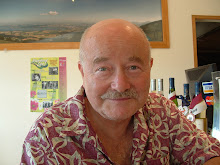
In an earlier post I spoke of Paradox and have referred to how Richard has referred to the concept in his book "The Naked Now". I want to revisit the concept briefly as I've just finished the book and there are a couple of juicy bits I'd like to share. Again the definition of dealing with something or some concept which appears paradoxical is "grasping the truth of something that seems a contradiction." (The usual response to the paradoxical in a dualistic mindset is to ignore or refute that which does not fit into an "A" or "B" universe. Experiencing the "Third" eye or path has been present in the Christian mystical tradition as well as others but we didn't recognize these as mysteries we just turned them into doctrinal beliefs.) "Think of Jesus = human AND divine, Mary = Virgin AND Mother, God = one AND three(Trinity), Eucharist = bread AND Jesus. Because paradox undermines dual thinking at its very root, the dualistic mind immediately attacks paradox as weak thinking or confusion, separate from hard logic." "Jesus, as the icon of Christ Consciousness(1Corinthians 2:16), is the total template of total paradox: human yet divine, heavenly yet earthly, physical yet spiritual, possessing a male body yet a female soul, killed yet alive, powerless yet powerful, victim yet victor, failure yet redeemer, marginalized yet central, singular yet everyone, incarnate yet cosmic, nailed yet liberated, resolving the great philosophical problem of the one and the many.... Jesus is the microcosm of the macrocosm.." And " Although I am a Catholic Christian, I am impressed that all three of the great Asian religions - Hindu Vedanta, Mahayana Buddhism, and Chinese Taoism - build upon a worldview of nonduality and paradox. Nor did Christianity overlook this identical insight. We merely said it a different way--...the unitive way or divine intimacy,(think Catholicum or universal)...Nonduality is expressed differently in different schools, and I do not fully agree with them all, but in Christianity nonduality was not a philosophical principle, not pantheism in any form, nor a denial of necessary differences. The nondual paradox and mystery was for Christians A Living Person, an Icon we could Gaze Upon and Fall In Love With. Jesus... That makes me joyful to be a Christian." (Non grammatical caps are mine, RV). Thank you, Richard! Last night I watched the movie "Gandi". It occurs to me that that wonderful man of God epitomized the sentiment of the last statement. He was a Hindu but considered himself to be "All of the Above" as a child of God. It is ironic that the prime result of his life's work at that time was the separation of India into the Muslim state of Pakistan and the Hindu state of India; and doubly ironic that he was finally shot by a religious zealot. My God... Please Open our eyes and hearts!! RV

No comments:
Post a Comment